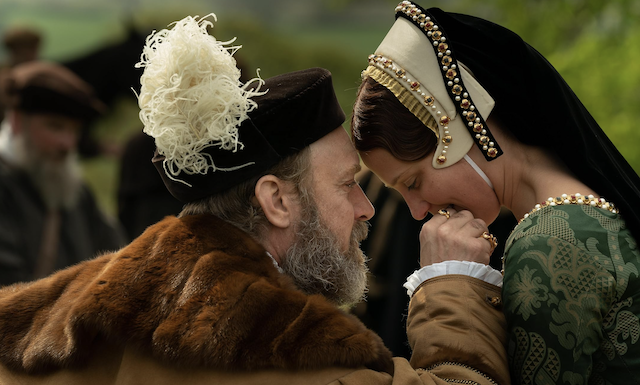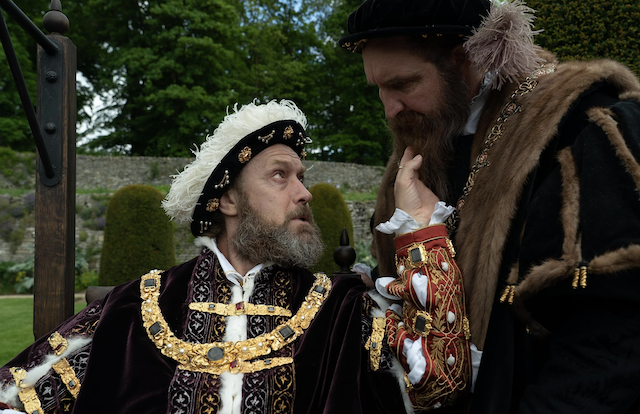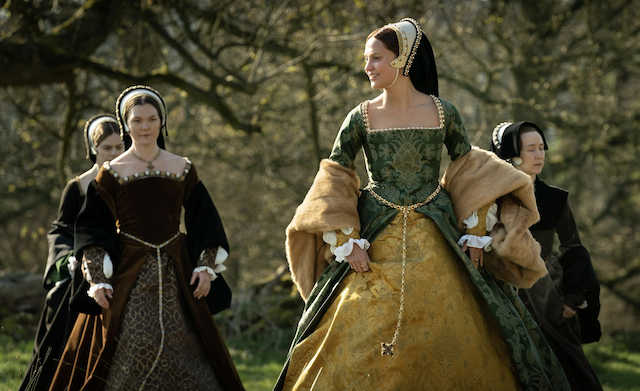
@Courtesy of Roadshow Attractions/Larry Horricks
Adapting the 2013 novel Queen’s Gambit by Elizabeth Freemantle, Firebrand brings back to the big screen one of the most controversial figures in Great Britain’s History, King Henry VIII (1491-1547). In the past magnificent actors like Charles Laughton (The Private Life of Henry VIII, 1933), Robert Shaw (A Man For All Seasons, 1966), and Richard Burton (Anne of the Thousand Days, 1969) played this role, mostly exploring and showing the reckless and larger than life personality of the king.
In this new version instead, Jude Law delivers a way darker and more macabre version of Henry VIII, portraying a tyrant in the last years of his life who is ruling the Country through fear and fanaticism while rotting inside. His main adversary is Katherine Parr, the last one of his wives, a woman whose more liberal approach to government and especially religious matters is generating more than one concern from the Church.
Firebrand and its director Karim Aïnouz dare to fly away from the iconic British style when it comes to period movies. The beauty of costumes and set design, the splendid images of David Lean or James Ivory’s movies – just to mention two of the most recognized directors – are not the primary intention: Firebrand on the contrary is a livid drama about the dark side of power and patriarchy.

@Courtesy of Roadshow Attractions/Larry Horricks
The extensive use of natural light strongly delivers a sense of anguish and imminent danger, used by the director to develop a very dark representation of the characters and story. Aïnouz is not afraid also to dig deep into the gory aspect of Henry VIII’s illness, constantly showing the leg’s wound that is going to jeopardize his life. That is probably an even too explicit metaphor about how male power can be poisonous and terrifying when abused, but it surely works.
In more than one scene Firebrand puts the audience in an uneasy position, observing first-hand the decay of flesh and bones of the tyrant, something he fights to the last breath becoming more and more suspicious and abusive. On the other side, Katherine Parr represents what is left of humanity, compassion, and love, surely, but also the tenacity of a woman who wants to gain all the power she can to change things. Forced to hide her own ideas and most of the time even feelings, she is absolutely not a passive character, knowing her disadvantaged position and fighting back against Henry VIII with the weapons of intelligence, lucidity, and human wisdom.

@Courtesy of Roadshow Attractions/Larry Horricks
Firebrand couldn’t have achieved this result if Alicia Vikander wouldn’t have performed her character as the perfect mirror of Jude Law. If the actor is in fact histrionic and flamboyant in his dark portrayal of the king, she can deliver a quietness, almost a “silent” performance that is totally coherent with the character. If you add to Firebrand an excellent supporting actor like Eddie Marsan, here you have a cast that is definitely worth sincere applause.
Through the fictionalized story of Henry VIII and his gruesome fall, Karim Aïnouz wants to convey to the audience a pretty clear message about our contemporary times: in the end, patriarchy is going to fall, but not without fighting to the bone. There will be blood, sweat, and pain. In order to achieve equality between genders, society must go through a shocking change. It is indeed a dark metaphor, a bleak vision of nowadays. But it isn’t a pessimistic one, since Firebrand ends with an image of hope and wisdom. The one of a woman who will become the symbol of good government even in the darkest times…
Rate: B
If you like the article, share your thoughts below!
Check out more of Adriano’s articles.
Here’s the trailer of Firebrand:

